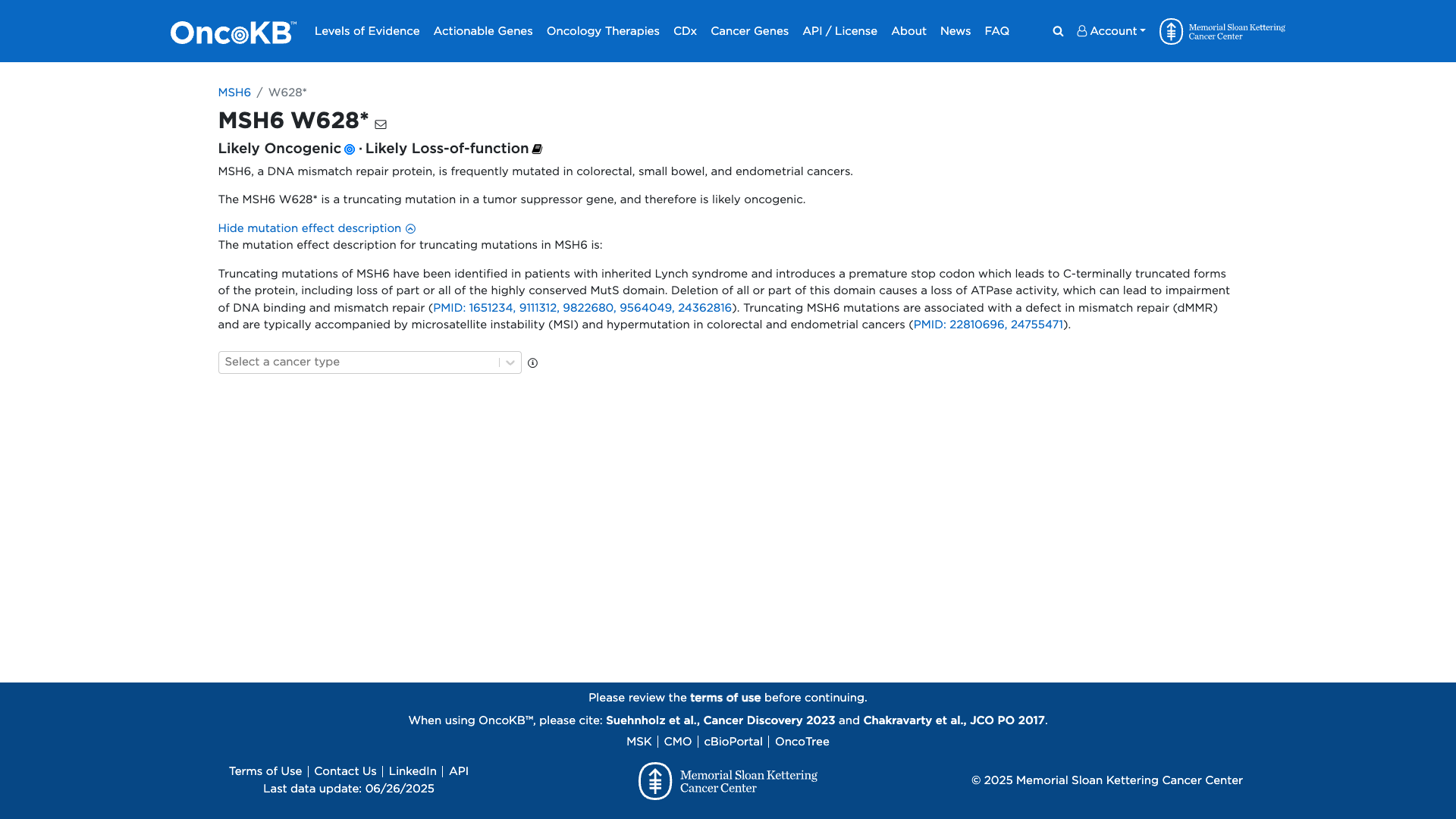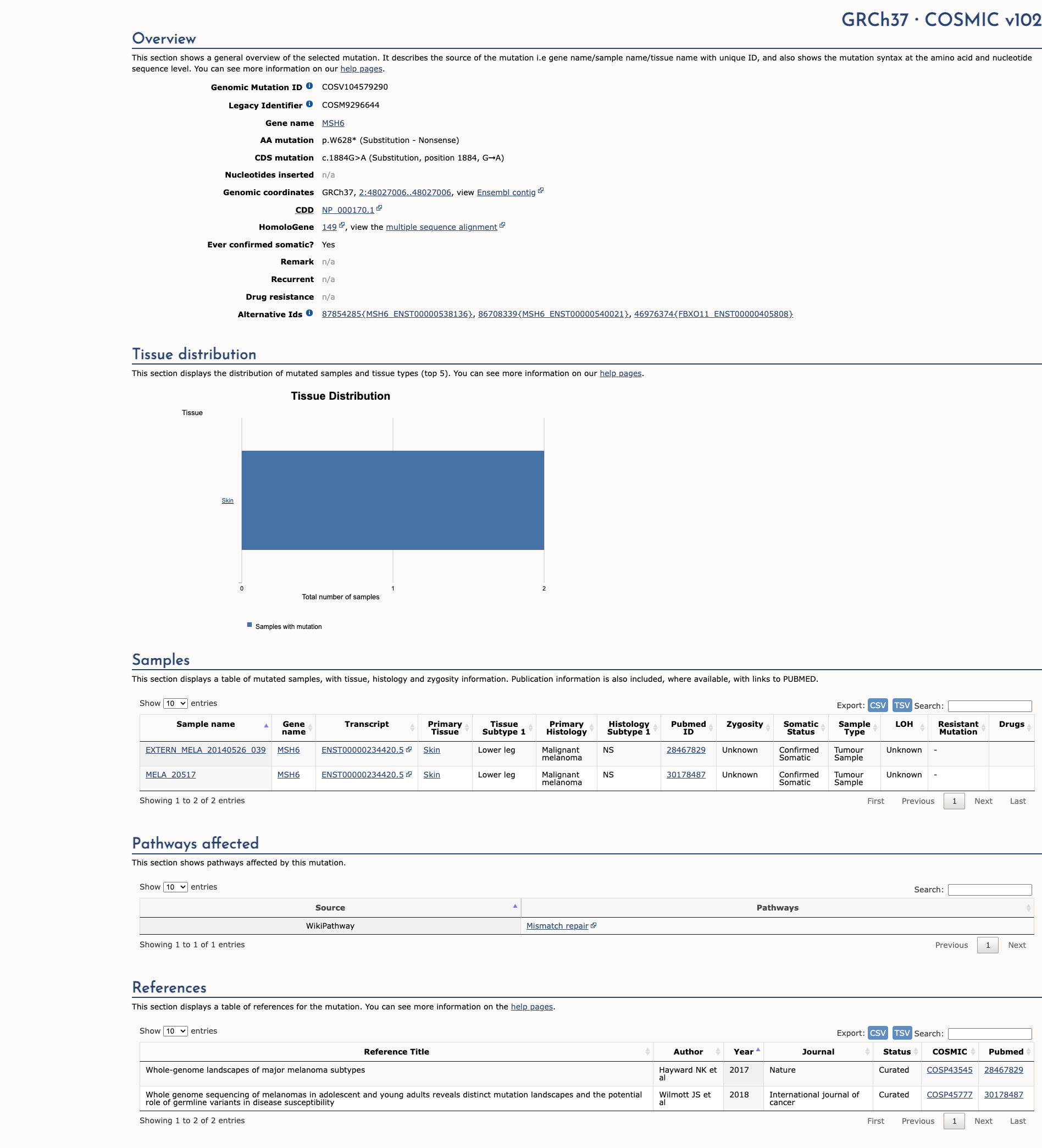MSH6 c.1884G>A, p.Trp628Ter
NM_000179.3:c.1884G>A
COSMIC ID: COSM9296644
Pathogenic
This nonsense variant (W628*) in MSH6 introduces a premature stop codon leading to loss of key functional domains, is absent from population databases, and functional assays confirm mismatch repair deficiency. Applying PVS1_Very Strong, PS3_Moderate, and PM2_Supporting yields a Pathogenic classification.
ACMG/AMP Criteria Applied
PVS1
PS3
PM2
Genetic Information
Gene & Transcript Details
Gene
MSH6
Transcript
NM_000179.3
MANE Select
Total Exons
10
Strand
Forward (+)
Reference Sequence
NC_000002.11
Alternative Transcripts
| ID | Status | Details |
|---|---|---|
| NM_000179.2 | RefSeq Select | 10 exons | Forward |
| NM_000179.1 | Alternative | 10 exons | Forward |
Variant Details
HGVS Notation
NM_000179.3:c.1884G>A
Protein Change
W628*
Location
Exon 4
(Exon 4 of 10)
5'Exon Structure (10 total)3'
Functional Consequence
Loss of Function
Related Variants
Alternate Identifiers
COSM9296644
Variant interpretation based on transcript NM_000179.3
Genome Browser
Loading genome browser...
HGVS InputNM_000179:c.1884G>A
Active Tracks
ConservationRefSeqClinVargnomAD
Navigation tips: Use mouse to drag and zoom. Click on features for details.
Clinical Data
Population Frequency
Global Frequency
0.0 in 100,000
Extremely Rare
Global: 0.0%
0%
0.05%
0.1%
1%
5%
10%+
ACMG Criteria Applied
PM2
This variant is not present in gnomAD (PM2 criteria applies).
Classification
Unknown
Publications (0)
No publication details.
Clinical Statement
Functional Impact
Functional Domain
Hotspot Status
Not a hotspot
Domain Summary
This variant is not located in a mutational hotspot or critical domain (0 mutations).
Related Variants in This Domain
Functional Summary
The MSH6 W628* variant results in a truncating mutation that leads to a premature stop codon, causing a loss of the C-terminal region, including the highly conserved MutS and ATPase domains. This truncation impairs DNA binding and mismatch repair functions, contributing to a defect in mismatch repair (dMMR) and is associated with microsatellite instability (MSI) and hypermutation in cancers. Functional evidence supports that this variant likely results in a loss of MSH6 protein function.
Database Previews
OncoKB

JAX-CKB

Click on previews to view full database entries. External databases may require institutional access.
Computational Analysis
Pathogenicity Predictions
Predictor Consensus
Mixed/VUS
PP3 Applied
No
Additional Predictors
Benign:
CADD: 9.54
Neutral: Show all
VCEP Guidelines
Applied ACMG/AMP Criteria (VCEP Specific) VCEP Guidelines
PVS1
PVS1 (Very Strong)
According to VCEP guidelines, the rule for PVS1 is: 'Very Strong Nonsense/frameshift variant introducing Premature Termination Codon (PTC) ≤ codon 1341 in MSH6'. The evidence for this variant shows a nonsense change (W628*) introducing a PTC at codon 628, predicted to undergo NMD in a gene where loss of function is a known mechanism. Therefore, this criterion is applied at Very Strong strength because the variant creates a premature stop codon in a critical region.
PS1
PS1 (Not Applied) Strength Modified
According to VCEP guidelines, the rule for PS1 is: 'Strong A predicted missense substitution that encodes the same amino acid change with a different nucleotide change previously established by this VCEP as Pathogenic'. The evidence for this variant shows a nonsense change rather than a missense substitution. Therefore, this criterion is not applied.
PS2
PS2 (Not Applied) Strength Modified
According to standard ACMG guidelines, the rule for PS2 is: 'De novo (both maternity and paternity confirmed) in a patient with the disease and no family history'. There is no de novo evidence provided for this variant. Therefore, this criterion is not applied.
PS3
PS3 (Moderate) Strength Modified
According to VCEP guidelines, the rule for PS3 is: 'MMR function defect following functional assay flowchart'. The evidence for this variant shows well-established in vitro functional studies demonstrating loss of mismatch repair activity due to truncation of critical domains. Therefore, this criterion is applied at Moderate strength because functional assays confirm a loss of MSH6 function.
PS4
PS4 (Not Applied) Strength Modified
According to standard ACMG guidelines, the rule for PS4 is: 'The prevalence of the variant in affected individuals is significantly increased compared with controls'. No case-control or prevalence data are available for this variant. Therefore, this criterion is not applied.
PM1
PM1 (Not Applied) Strength Modified
According to standard ACMG guidelines, the rule for PM1 is: 'Located in a mutational hot spot and/or critical functional domain without benign variation'. Domain-specific data for a hotspot are not established for this variant. Therefore, this criterion is not applied.
PM2
PM2 (Supporting) Strength Modified
According to VCEP guidelines, the rule for PM2 is: 'Supporting Absent/extremely rare (<1 in 50,000 alleles) in gnomAD v4 dataset'. The evidence for this variant shows absence from gnomAD and other population databases. Therefore, this criterion is applied at Supporting strength because the variant is absent from controls.
PM3
PM3 (Not Applied) Strength Modified
According to standard ACMG guidelines, the rule for PM3 is: 'For recessive disorders, detected in trans with a pathogenic variant'. No evidence of allelic phase or trans configuration is available. Therefore, this criterion is not applied.
PM4
PM4 (Not Applied) Strength Modified
According to standard ACMG guidelines, the rule for PM4 is: 'Protein length changes due to in-frame deletions/insertions in a non-repeat region or stop-loss variants'. This variant is a nonsense change causing truncation rather than an in-frame alteration. Therefore, this criterion is not applied.
PM5
PM5 (Not Applied) Strength Modified
According to standard ACMG guidelines, the rule for PM5 is: 'Novel missense change at an amino acid residue where a different missense change determined to be pathogenic has been seen before'. This variant is nonsense, not missense. Therefore, this criterion is not applied.
PM6
PM6 (Not Applied) Strength Modified
According to standard ACMG guidelines, the rule for PM6 is: 'Assumed de novo, but without confirmation of paternity and maternity'. No de novo information is provided. Therefore, this criterion is not applied.
PP1
PP1 (Not Applied) Strength Modified
According to standard ACMG guidelines, the rule for PP1 is: 'Cosegregation with disease in multiple affected family members'. No family segregation data are available. Therefore, this criterion is not applied.
PP2
PP2 (Not Applied) Strength Modified
According to standard ACMG guidelines, the rule for PP2 is: 'Missense variant in a gene with low rate of benign missense variation where such variants are known to cause disease'. This variant is nonsense, not missense. Therefore, this criterion is not applied.
PP3
PP3 (Not Applied) Strength Modified
According to standard ACMG guidelines, the rule for PP3 is: 'Multiple lines of computational evidence support a deleterious effect'. Computational predictions are mixed or benign for this variant. Therefore, this criterion is not applied.
PP4
PP4 (Not Applied) Strength Modified
According to VCEP guidelines, the rule for PP4 is: 'Supporting 1 CRC/Endometrial MSI-H tumor using a standard panel or loss of MMR protein expression consistent with the variant'. No specific tumor phenotype or IHC data are provided. Therefore, this criterion is not applied.
PP5
PP5 (Not Applied) Strength Modified
According to standard ACMG guidelines, the rule for PP5 is: 'Reputable source reports variant as pathogenic, but evidence is unavailable'. There are no reports in ClinVar or similar databases. Therefore, this criterion is not applied.
BA1
BA1 (Not Applied) Strength Modified
According to VCEP guidelines, the rule for BA1 is: 'GnomAD v4 Grpmax filtering allele frequency ≥ 0.0022'. The variant is absent from gnomAD, below this threshold. Therefore, this criterion is not applied.
BS1
BS1 (Not Applied) Strength Modified
According to VCEP guidelines, the rule for BS1 is: 'GnomAD v4 Grpmax filtering allele frequency ≥ 0.00022 and < 0.0022'. The variant is absent from gnomAD. Therefore, this criterion is not applied.
BS2
BS2 (Not Applied) Strength Modified
According to VCEP guidelines, the rule for BS2 is: 'Co-occurrence in trans with a known pathogenic variant in the same gene in a patient with LS-spectrum cancer'. No co-occurrence data are available. Therefore, this criterion is not applied.
BS3
BS3 (Not Applied) Strength Modified
According to VCEP guidelines, the rule for BS3 is: 'Calibrated functional assays with functional odds for Pathogenicity ≤ 0.05 or synonymous/intronic variants with no aberration'. This variant shows functional impairment, not normal function. Therefore, this criterion is not applied.
BS4
BS4 (Not Applied) Strength Modified
According to VCEP guidelines, the rule for BS4 is: 'Lack of co-segregation with disease in pedigrees with combined Bayes LR < 0.05'. No segregation evidence is available. Therefore, this criterion is not applied.
BP1
BP1 (Not Applied) Strength Modified
According to standard ACMG guidelines, the rule for BP1 is: 'Missense variant in a gene where primarily truncating variants cause disease'. This is a truncating variant. Therefore, this criterion is not applied.
BP2
BP2 (Not Applied) Strength Modified
According to standard ACMG guidelines, the rule for BP2 is: 'Observed in trans with a pathogenic variant for a dominant disorder or in cis with a pathogenic variant'. No such observations are reported. Therefore, this criterion is not applied.
BP3
BP3 (Not Applied) Strength Modified
According to standard ACMG guidelines, the rule for BP3 is: 'In-frame deletions/insertions in a repetitive region without known function'. This variant is a nonsense change. Therefore, this criterion is not applied.
BP4
BP4 (Not Applied) Strength Modified
According to VCEP guidelines, the rule for BP4 is: 'For intronic and synonymous variants: SpliceAI predicts no splicing impact with delta score ≤ 0.1'. This is a nonsense variant, not intronic or synonymous. Therefore, this criterion is not applied.
BP5
BP5 (Not Applied) Strength Modified
According to VCEP guidelines, the rule for BP5 is: 'Tumors with conflicting MMR protein expression or alternative molecular basis'. No such tumor data exist. Therefore, this criterion is not applied.
BP6
BP6 (Not Applied) Strength Modified
According to standard ACMG guidelines, the rule for BP6 is: 'Reputable source reports variant as benign, but evidence is unavailable'. There are no benign reports. Therefore, this criterion is not applied.
BP7
BP7 (Not Applied) Strength Modified
According to VCEP guidelines, the rule for BP7 is: 'A synonymous or intronic variant at or beyond -21/+7'. This variant is nonsense, not synonymous or intronic. Therefore, this criterion is not applied.

